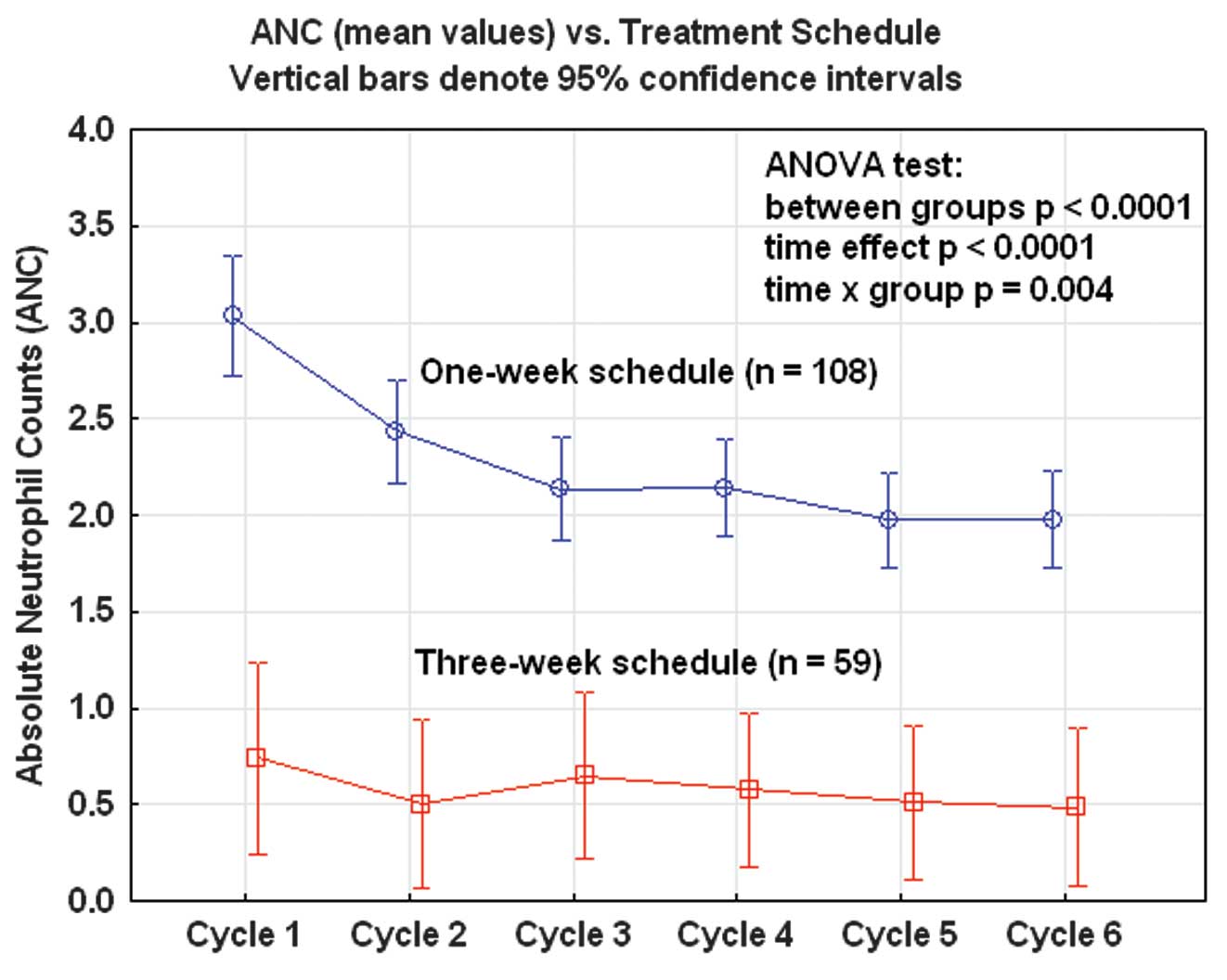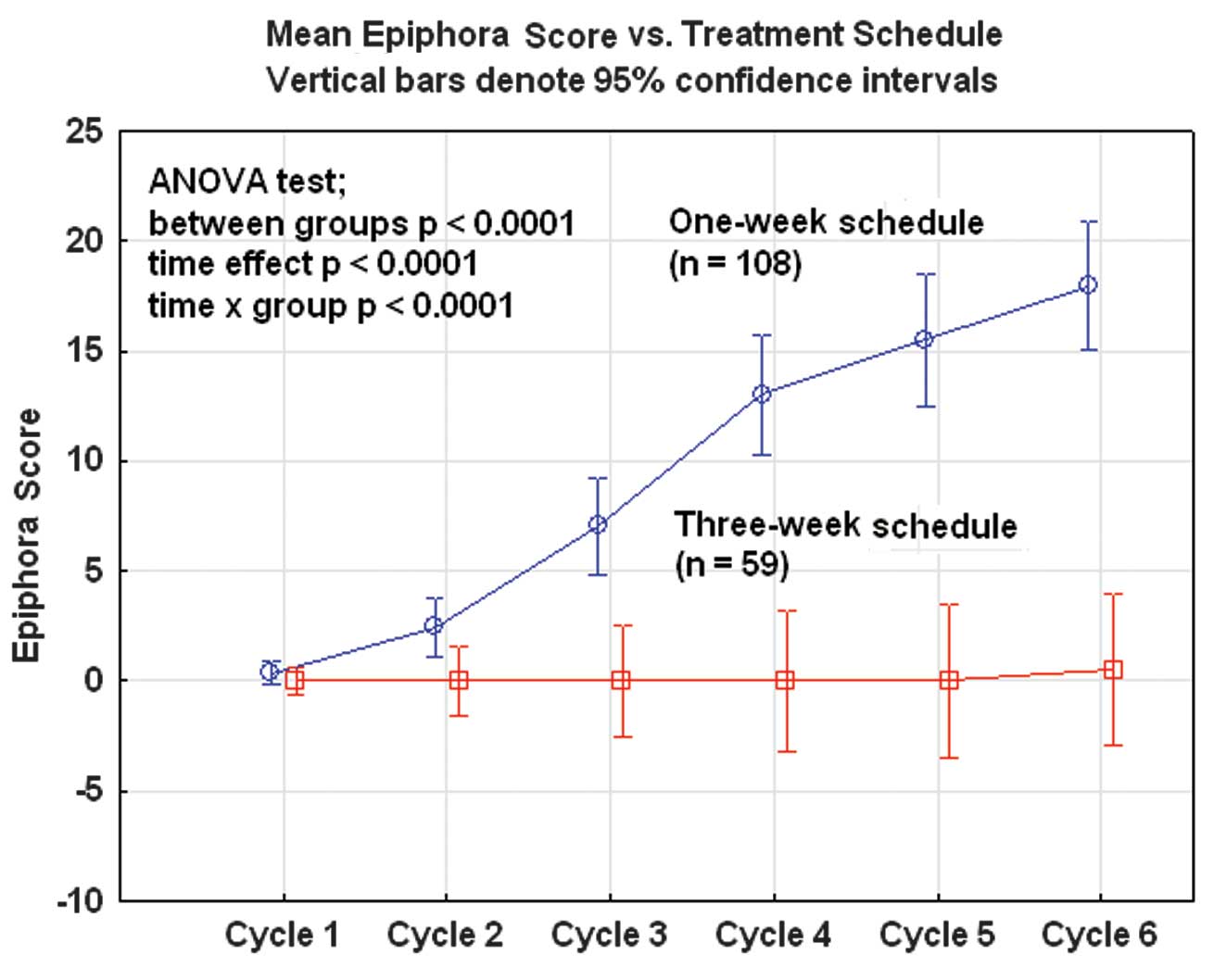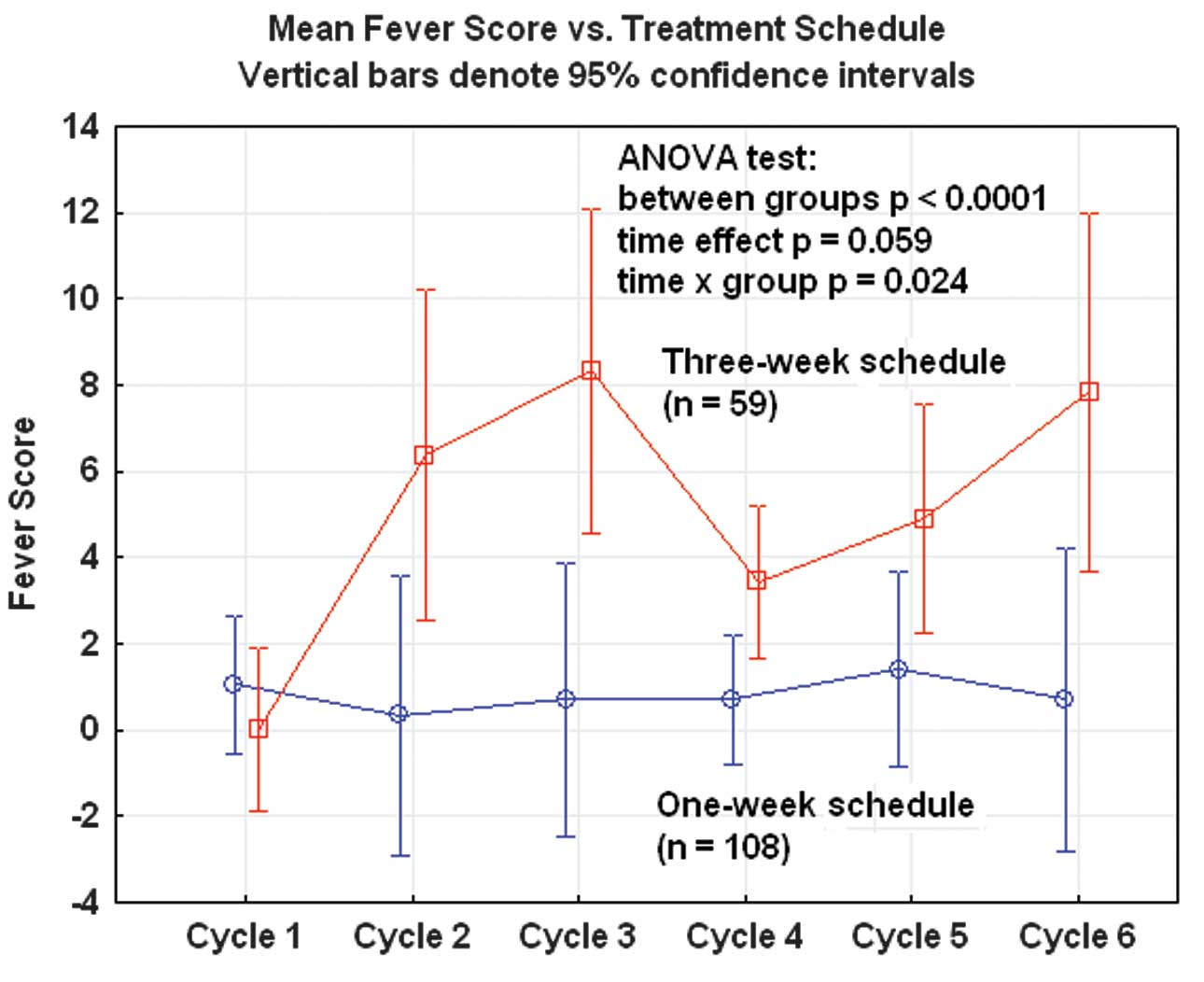|
1
|
Ferlay J, Shin HR, Bray F, et al: GLOBOCAN
2008, Cancer incidence and mortality worldwide: IARC CaseBase No.
10. Lyon, France: International Agency for Research on Cancer;
2010
|
|
2
|
McGuire WP, Hoskins WJ, Brady MF, et al:
Cyclophosphamide and cisplatin compared with paclitaxel and
cisplatin in patients with stage III and stage IV ovarian cancer. N
Engl J Med. 334:1–6. 1996. View Article : Google Scholar : PubMed/NCBI
|
|
3
|
Copeland LJ, Bookman M and Trimble E:
Gynecologic Oncology Group Protocol GOG 182-ICON5. Clinical trials
of newer regimens for treating ovarian cancer: the rationale for
Gynecologic Oncology Group Protocol GOG 182-ICON5. Gynecol Oncol.
90:S1–S7. 2003. View Article : Google Scholar : PubMed/NCBI
|
|
4
|
Safra T, Menczer J, Bernstein RM, et al:
Combined weekly carboplatin and paclitaxel as primary treatment of
advanced epithelial ovarian carcinoma. Gynecol Oncol. 114:215–218.
2009. View Article : Google Scholar
|
|
5
|
Sehouli J, Stengel D, Mustea A, et al:
Weekly paclitaxel and carboplatin (PC-W) for patients with primary
advanced ovarian cancer: results of a multicenter phase-II study of
the NOGGO. Cancer Chemother Pharmacol. 61:243–250. 2008. View Article : Google Scholar : PubMed/NCBI
|
|
6
|
Katsumata N, Yasuda M, Takahashi F, et al:
Dose-dense paclitaxel once a week in combination with carboplatin
every 3 weeks for advanced ovarian cancer: a phase 3, open-label,
randomised controlled trial. Lancet. 374:1331–1338. 2009.
View Article : Google Scholar : PubMed/NCBI
|
|
7
|
Kavanagh JJ: Docetaxel in the treatment of
ovarian cancer. Oncology. 16:73–81. 2002.PubMed/NCBI
|
|
8
|
Katsumata N: Docetaxel: an alternative
taxane in ovarian cancer. Br J Cancer. 89:S9–S15. 2003. View Article : Google Scholar : PubMed/NCBI
|
|
9
|
Vasey PA, Jayson GC, Gordon A, et al:
Phase III randomized trial of docetaxel-carboplatin versus
paclitaxel-carboplatin as first-line chemotherapy for ovarian
carcinoma. J Natl Cancer Inst. 96:1682–1691. 2004. View Article : Google Scholar : PubMed/NCBI
|
|
10
|
Kushner DM, Connor JP, Sanchez F, et al:
Weekly docetaxel and carboplatin for recurrent ovarian and
peritoneal cancer: a phase II trial. Gynecol Oncol. 105:358–364.
2007. View Article : Google Scholar : PubMed/NCBI
|
|
11
|
Tinker AV, Gebski V, Fitzharris B, et al:
Phase II trial of weekly docetaxel for patients with relapsed
ovarian cancer who have previously received paclitaxel - ANZGOG
02-01. Gynecol Oncol. 104:647–653. 2007. View Article : Google Scholar : PubMed/NCBI
|
|
12
|
Gupta D, Owers RL, Kim M, et al: A phase
II study of weekly topotecan and docetaxel in heavily treated
patients with recurrent uterine and ovarian cancers. Gynecol Oncol.
113:327–330. 2009. View Article : Google Scholar : PubMed/NCBI
|
|
13
|
Safra T, Bernstein Molho R, Menzcher J, et
al: A feasibility study of weekly docetaxel with capecitabine in
ovarian cancer: a promising combination of two active drugs with a
potential for synergism. Chemotherapy. 55:298–302. 2009. View Article : Google Scholar : PubMed/NCBI
|
|
14
|
Terauchi F, Hirano T, Taoka H, et al:
Weekly docetaxel for patients with
platinum/paclitaxel/irinotecan-resistent relapsed ovarian cancer: a
phase I study. Int J Clin Oncol. 8:348–351. 2003. View Article : Google Scholar : PubMed/NCBI
|
|
15
|
Berkenblit A, Seiden MV, Matulonis UA, et
al: A phase II trial of weekly docetaxel in patients with
platinum-resitent epithelial ovarian, primary peritoneal serous
cancer, or fallopian tube cancer. Gynecol Oncol. 95:624–631. 2004.
View Article : Google Scholar : PubMed/NCBI
|
|
16
|
Komiyama S, Tsuji H, Asai S, et al: A
pilot study of weekly docetaxel therapy for recurrent ovarian
cancer, tubal cancer, and primary peritoneal cancer. Eur J Gynaecol
Oncol. 6:299–302. 2005.PubMed/NCBI
|
|
17
|
Sorbe B, Graflund M, Horvath G, Swahn M,
Boman K, Bangshöj R, Lood M and Malmström H: Phase II study of
docetaxel weekly in combination with carboplatin every 3 weeks as
first-line chemotherapy in stage IIB to stage IV epithelial ovarian
cancer. Int J Gynecol Cancer. 22:47–53. 2012. View Article : Google Scholar
|
|
18
|
Sorbe B, Graflund M, Horvath G, Swahn M,
Boman K, Bangshöj R, Lood M and Malmström H: A phase II study of
docetaxel weekly in combination with carboplatin every three weeks
as first line chemotherapy in stage IIB-IV epithelial ovarian
cancer: neurological toxicity and quality-of-life evaluation. Int J
Oncol. 40:773–781. 2012.
|
|
19
|
Calvert AH, Newell DR, Gunbrell LA, et al:
Carboplatin dosage: prospective evaluation of a simple formula
based on renal function. J Clin Oncol. 7:1748–1756. 1989.PubMed/NCBI
|
|
20
|
Cockcroft DW and Gault MH: Prediction of
creatinine clearance from serum creatinine. Nephron. 16:31–41.
1976. View Article : Google Scholar : PubMed/NCBI
|
|
21
|
Green S and Weiss GR: Southwest oncology
group standard response criteria, endpoint definitions and toxicity
criteria. Invest New Drugs. 10:239–253. 1992. View Article : Google Scholar : PubMed/NCBI
|
|
22
|
Rustin GJ, Marples M and Nelstrop AE: Use
of CA-125 in clinical trial evaluation of new therapeutic drugs for
ovarian cancer. Clin Cancer Res. 10:3919–3926. 2004. View Article : Google Scholar : PubMed/NCBI
|
|
23
|
National Institute of Health: Common
Terminology Criteria for Adverse Events (Version 3.0). National
Institute of Health; Washington, DC: 2003
|
|
24
|
Fayers P, Aaronson N, Bjordal K, et al:
EORTC QLQ-C30 Scoring Manual. 3rd edition. EORTC publications;
Brussels, Belgium: 2001
|
|
25
|
Micha JP, Goldstein BH, Rettenmaier MA, et
al: A phase II study of outpatient first-line paclitaxel,
carboplatin, and bevacizumab for advanced-stage epithelial ovarian,
peritoneal, and fallopian tube cancer. Int J Gynecol Cancer.
17:771–776. 2007. View Article : Google Scholar : PubMed/NCBI
|
|
26
|
Penson RT, Dizon DS, Cannistra SA, et al:
Phase II study of carboplatin, paclitaxel, and bevacizumab with
maintenance bevacizumab as first-line chemotherapy for advanced
mullerian tumors. J Clin Oncol. 28:154–159. 2010. View Article : Google Scholar : PubMed/NCBI
|
|
27
|
Seidman AD, Berry D, Cirrincione C, et al:
Randomized phase III trial of weekly compared with every-3-weeks
paclitaxel for metastatic breast cancer, with trastuzumab for all
HER-2 overexpressors and random assignment to trastuzumab or not in
HER-2 nonoverexpressors: final results of Cancer and Leukemia Group
B protocol 9840. J Clin Oncol. 26:1642–1649. 2008.
|
|
28
|
Esmaeli B, Hidaji L, Adinin RB, et al:
Blockage of the lacrimal drainage apparatus as a side effect of
docetaxel therapy. Cancer. 98:504–507. 2003. View Article : Google Scholar : PubMed/NCBI
|
|
29
|
Oishi T, Kigawa J, Fujiwara K, et al: A
feasibility study on biweekly administration of docetaxel for
patients with recurrent ovarian cancer. Gynecol Oncol. 90:421–424.
2003. View Article : Google Scholar : PubMed/NCBI
|
|
30
|
Paul LJ and Cohen PR:
Paclitaxel-associated subungual pyogenic granuloma: report in a
patient with breast cancer receiving paclitaxel and review of
drug-induced pyogenic granulomas adjacent and beneath the nail. J
Drugs Dermatol. 11:262–268. 2012.
|
|
31
|
Bezjak A, Tu D, Bacon M, et al: Quality of
life in ovarian cancer patients: Comparison of paclitaxel plus
cisplatin, with cyclophosphamide plus cisplatin in randomized
study. J Clin Oncol. 22:4595–4603. 2004. View Article : Google Scholar : PubMed/NCBI
|
|
32
|
Souglakos J, Kotsakis A, Kouroussis C, et
al: Nonneutropenic febrile episodes associated with docetaxel-based
chemotherapy in patients with solid tumors. Cancer. 95:1326–1333.
2002. View Article : Google Scholar : PubMed/NCBI
|
|
33
|
Greimel ER, Bjelic-Radisic V, Pfisterer J,
et al: Randomized study of the Arbeitsgemeinschaft Gynaekologische
Onkologie Ovarian Cancer Study Group comparing quality of life in
patients with ovarian cancer treated with cisplatin/paclitaxel
versus carboplatin/paclitaxel. J Clin Oncol. 24:579–586. 2006.
View Article : Google Scholar
|
|
34
|
Schwarz R and Hinz A: Reference data for
the quality of life questionnaire EORTC QLQ-C30 in the general
German population. Eur J Cancer. 37:1345–1351. 2001. View Article : Google Scholar : PubMed/NCBI
|
|
35
|
Almadrones L, McGuire DB, Walczak JR, et
al: Psychometric evaluation of two scales assessing functional
status and peripheral neuropathy associated with chemotherapy for
ovarian cancer: A Gynecologic Oncology Group study. Oncol Nurs
Forum. 31:615–623. 2004. View Article : Google Scholar
|
|
36
|
Wenzel L, Huang HQ, Monk BJ, et al:
Quality-of-life comparisons in a randomized trial of interval
secondary cytoreduction in advanced ovarian carcinoma: A
Gynecologic Oncology Group study. J Clin Oncol. 23:5605–5612. 2005.
View Article : Google Scholar : PubMed/NCBI
|

















